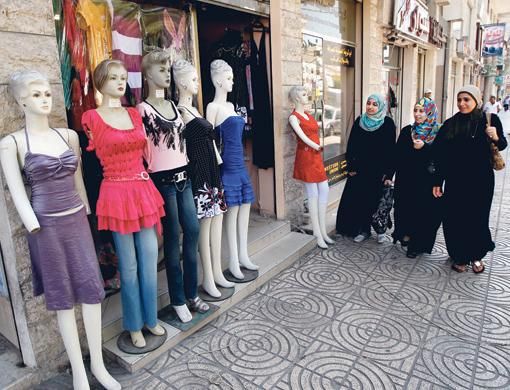Gaza City: Police order a lingerie shop to hide its scantily clad mannequins. A judge warns female lawyers to wear headscarves in court. Beach patrols break up groups of singles and make men wear shirts.
It's all part of a new Hamas campaign to get Gazans to adhere to a strict Muslim lifestyle. Hamas insists compliance with its "virtue campaign" is still voluntary and simply responds to a Gazan preference for conservative ways. But the rules are vague and there are reports of alleged offenders being beaten and teachers being told to pressure girls to wear headscarves.
Hamas pledged after its June 2007 takeover to refrain from imposing Islamic ways. That is changing, says Khalil Abu Shammala, a human rights activist in Gaza.
"There are attempts to Islamise this society," he said. Hamas' denials "contradict what we see on the street."
The "virtue campaign' is being spread by the Religious Affairs Ministry in a list of do's and don'ts that feature on posters and in mosque sermons. It also calls for gender separation at wedding parties and tells teens to shun pop music with suggestive lyrics.
"We have to encourage people to be virtuous and keep them away from sin," said Abdullah Abu Jarbou, the deputy religious affairs minister.
Another Gaza human rights activist, Hamdi Shakour, blamed the border blockade imposed by Israel and Egypt after Hamas ousted the territory's Fatah rulers. He said isolation has bred "extremism and dark ideas".
Gaza maintains small islands of secularism. Foreigners are rarely harassed, and Gaza women in stylish clothes and hairdos, many of them Muslims, frequent a half-dozen upmarket cafes and restaurants.
But Abdul Raouf Halabi, Gaza's chief supreme court judge, last month ordered female lawyers to wear headscarves and dark robes or be barred from courtrooms when their work resumes September 1.
"We will not allow people to ruin morals," he said.
One of the unscarved is Subhiya Juma, who said the ruling "is taking away our personal freedom."
In government schools, headscarves for female students are supposed to be optional. But one high school has made robes and headscarves a condition for enrolment. Teachers are now being asked to pressure the girls to put them on, said Education Ministry spokesman Khalid Radi.
Police are enforcing the restrictions on mannequins and salesmen say they ripped off the tags on packages which showed women in underwear. Others said they were told to remove the mannequins' heads so they don't violate the Islamic ban on copying the human form. Enforcement is uneven and seems restricted to working-class markets.
On a Gaza beach, Mohammad Amta, 18, said a plainclothes security man told him to put on a shirt, saying his appearance was un-Islamic, and to remove his two silver rings and woven bracelet because they were a sign of Western culture.
Last month, three young men walking on the beach with a female friend said they were beaten by Hamas police, detained and ordered to sign statements promising not to engage in "immoral activities."
The Hamas government condemned the beatings. Abu Jarbou, the deputy minister, insisted Hamas would move gradually and not impose its views by force. Still, Islamic law is coming, he said.
"In the future, it's inevitable it will be implemented."













